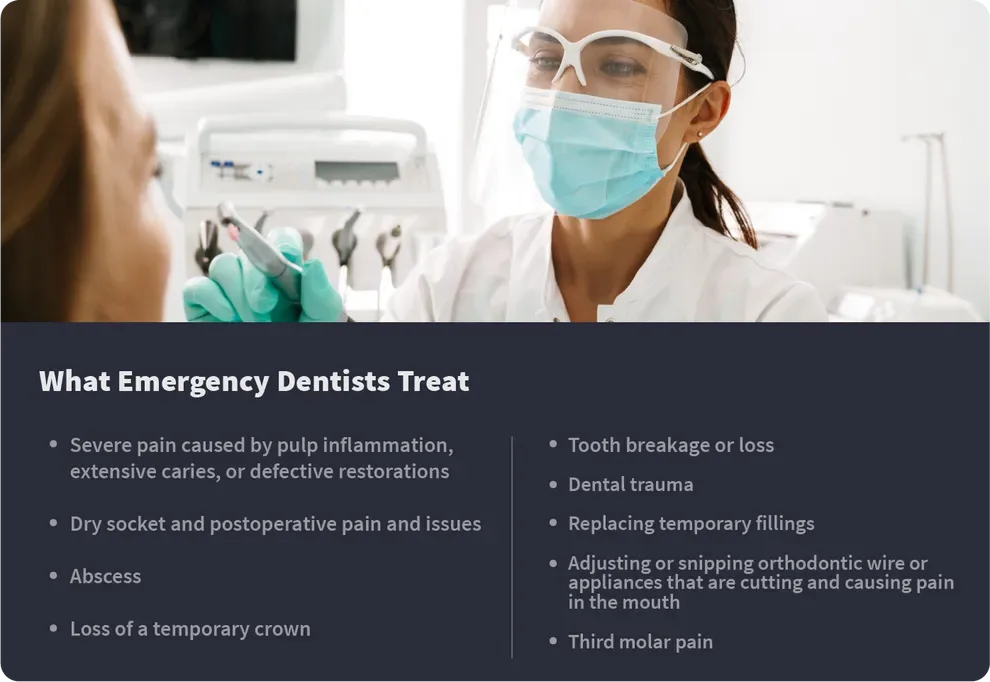Emergency Dentists: What They Treat & How to Find One

Table of Contents
- About Emergency Dentists
- How They Can Help
- How to Find One
- Insurance Coverage
An emergency dentist is a dentist that often offers walk-in and after-hours appointments. Your dentist may even offer emergency dentist services.
Tooth pain is one of the most common dental issues and can strike at any time, often at the most inconvenient moments. Dental and oral health emergencies do not wait for standard business hours. Often, your dentist office is not open or available when you need help.
Emergency dentists most consistently offer temporary relief until you can get back to your regular dentist for a more permanent fix. Emergency dentist services can save you money on high ER bills, and they offer specialized dental services, which most emergency rooms do not. Often, dental insurance will cover a portion of emergency dentistry.
About Emergency Dentists
An emergency dentist is a dentist who works with walk-ins and often after-hours, such as in the evening and on weekends. They can work out of a traditional dental office, or they may be housed in an emergency dental clinic.
Emergency dentists often do not have the same equipment that traditional dentists have. They generally work to manage pain, treating the problem quickly and efficiently, often in a temporary manner. You will usually still need to follow up with your regular dentist after seeing an emergency dentist.
The main goal of an emergency dentist is generally to stabilize you until you can get in to see your regular dentist.

How Emergency Dentists Can Help
An actual dental emergency is classified by the American Dental Association (ADA) as something that is potentially life-threatening, such as uncontrolled bleeding, infection that makes it hard to breathe, or injury/trauma to the bones of the face. Urgent dental care involves management of severe pain and/or the risk of infection.
Emergency dentists aim to minimize pain and reduce the risk of infection in as minimally invasive a way as possible. Again, they will typically stabilize you and your oral health until you can get in to see your regular dentist for a more permanent fix.
These are examples of issues an emergency dentist can treat:
Severe pain caused by pulp inflammation, extensive caries, or defective restorations
Dry socket and postoperative pain and issues
Abscess
Loss of a temporary crown
Tooth breakage or loss
Dental trauma
Replacing temporary fillings
Adjusting or snipping orthodontic wire or appliances that are cutting and causing pain in the mouth
Third molar pain
While crowns and fillings can last over ten years without needing any maintenance or replacement, there is still a possibility that they fall out early, which can cause unnecessary pain and discomfort, creating the need for an emergency dentist.
Finding an Emergency Dentist
To find an emergency dentist, first start with your dentist’s office. They may even have emergency dental services themselves. If they do not, they can often recommend other local dentists or emergency dental services nearby.
Your dentist may provide a 24-hour emergency call-in service that can walk you through what to do in the event of dental issues after hours. This service can help you decide what to do and if you need emergency care right away.
Emergency dental clinics are often local, open long hours, and accept walk-ins. Services such as Open Care can help you locate available emergency dentists near your location. State health departments and local hospitals can provide information on local emergency dental care options.
Insurance Coverage for Emergency Dentistry
If your dentist offers emergency dental care and already takes your insurance, you can generally use this to offset your bill.
Emergency dentists specifically often require cash payments up front. Your insurance can potentially reimburse you if it is classified as medically necessary and something that is normally covered.
It can be beneficial to check with your dental insurance provider to determine if the services will be covered and at what amount before receiving care. Your insurance provider can point you to local in-network providers that are covered at a better rate than out-of-network providers.
Emergency dental services are often cost-prohibitive and only partially covered by insurance. Emergency dentists may offer payment plans to make the final bill more manageable. Some emergency dental care may be provided by your local health department or public assistance programs.
